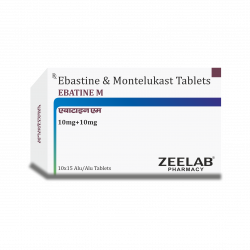Ebastine + Montelukast
Introduction
Ebastine + Montelukast is a combination medicine commonly prescribed for managing allergic conditions such as hay fever, runny nose, sneezing, and asthma-related symptoms. It combines the effects of Ebastine, an antihistamine, and Montelukast, a leukotriene receptor antagonist, to provide long-lasting relief. This medicine helps improve breathing, reduce allergic responses, and enhance overall comfort for people dealing with seasonal allergies and chronic asthma.
Available Medicine for Ebastine + Montelukast
Uses of Ebastine + Montelukast
- Treats allergic rhinitis (hay fever)
- Helps manage asthma symptoms by reducing inflammation
- Reduces sneezing, runny nose, and itchy eyes caused by allergies
- Improves breathing and reduces wheezing in asthma patients
- Prevents exercise-induced bronchoconstriction (EIB)
How Ebastine + Montelukast works
Ebastine works by blocking histamine receptors in the body, which helps prevent the symptoms of allergies like itching, sneezing, and runny nose. Montelukast, on the other hand, works by blocking leukotrienes, which are chemicals that cause inflammation in the airways. This combination effectively reduces allergy symptoms and prevents asthma attacks, allowing for improved breathing and overall comfort in patients with asthma and allergic conditions.
Benefits of Ebastine + Montelukast
- Provides relief from allergy symptoms like sneezing, itching, and congestion
- Reduces inflammation in the airways, making it easier to breathe
- Prevents asthma attacks and reduces the need for additional medications
- Helps manage seasonal and perennial allergic rhinitis
- Improves quality of life for individuals suffering from allergies or asthma
How to take Ebastine + Montelukast
Ebastine + Montelukast is usually taken once a day, with or without food. It is available in tablet form, and the dosage depends on the severity of your condition and your doctor`s recommendations. It is important to follow the prescribed dosage and not to take more than the recommended amount. Always consult with your doctor or pharmacist before making any changes to your medication regimen.
Type of Dosage Available
Side effects of Ebastine + Montelukast
- Headache
- Drowsiness or tiredness
- Stomach pain or upset
- Dry mouth
- Rash or skin irritation
- In rare cases, mood changes or depression
Safety advice
- Consult your doctor before using if you have a history of liver disease, kidney disease, or any other serious health condition
- Do not use Ebastine + Montelukast if you are allergic to any of the ingredients in the medication
- It is not recommended for children under a certain age; consult a pediatrician before use
- Monitor for side effects, particularly if you are taking other medications concurrently
- Always inform your healthcare provider about any other drugs you are taking to avoid interactions
Frequently Asked Questions (FAQs)
Q. What is Ebastine + Montelukast used for?
A. Ebastine + Montelukast is used to treat allergic rhinitis, asthma, and to relieve symptoms such as sneezing, runny nose, and difficulty breathing caused by allergies and asthma.
Q. How does Ebastine + Montelukast work?
A. Ebastine blocks histamine receptors to prevent allergy symptoms, while Montelukast blocks leukotrienes to reduce inflammation in the airways and prevent asthma attacks.
Q. What are the side effects of Ebastine + Montelukast?
A. Common side effects may include headache, drowsiness, stomach pain, dry mouth, and rash. In rare cases, mood changes may occur. Consult your doctor if any side effects persist.
Q. How should I take Ebastine + Montelukast?
A. Take Ebastine + Montelukast once a day, with or without food, as prescribed by your doctor. Follow the recommended dosage and do not exceed it.
Q. Can Ebastine + Montelukast be used for children?
A. Consult your pediatrician before giving Ebastine + Montelukast to children, as the dosage and suitability may vary depending on the child`s age and medical condition.
Disclaimer : Zeelab Pharmacy provides health information for knowledge only. Do not self-medicate. Always consult a qualified doctor before starting, stopping, or changing any medicine or treatment.
Download India's most affordable pharmacy app
- Compare with medicine prices
- Save upto 90% on your medicine bills

Temperature Controlled storage and delivery

Regular Sanitization

Disinfected Packaging

Temperature Checks
No Contact Delivery
Easy Return on Issues
60M+
Visitors4L+
Customers7L+
Orders Delivered1800+
Cities60M+
Visitors7L+
Order Delivered4L+
Customers1800+
CitiesNeed Medicines Quick?
Share location to check quick delivery serviceability.
Change Location
Location Access Needed
Your location appears to be blocked or disabled.
Please enable the location from your browser or
device settings.

₹ 0
0
Items added
Quick Links
Categories
Our Policies
2026 Copyright By © Zeelab Pharmacy Private Limited. All Rights Reserved
Our Payment Partners

 Added!
Added!
|
|










